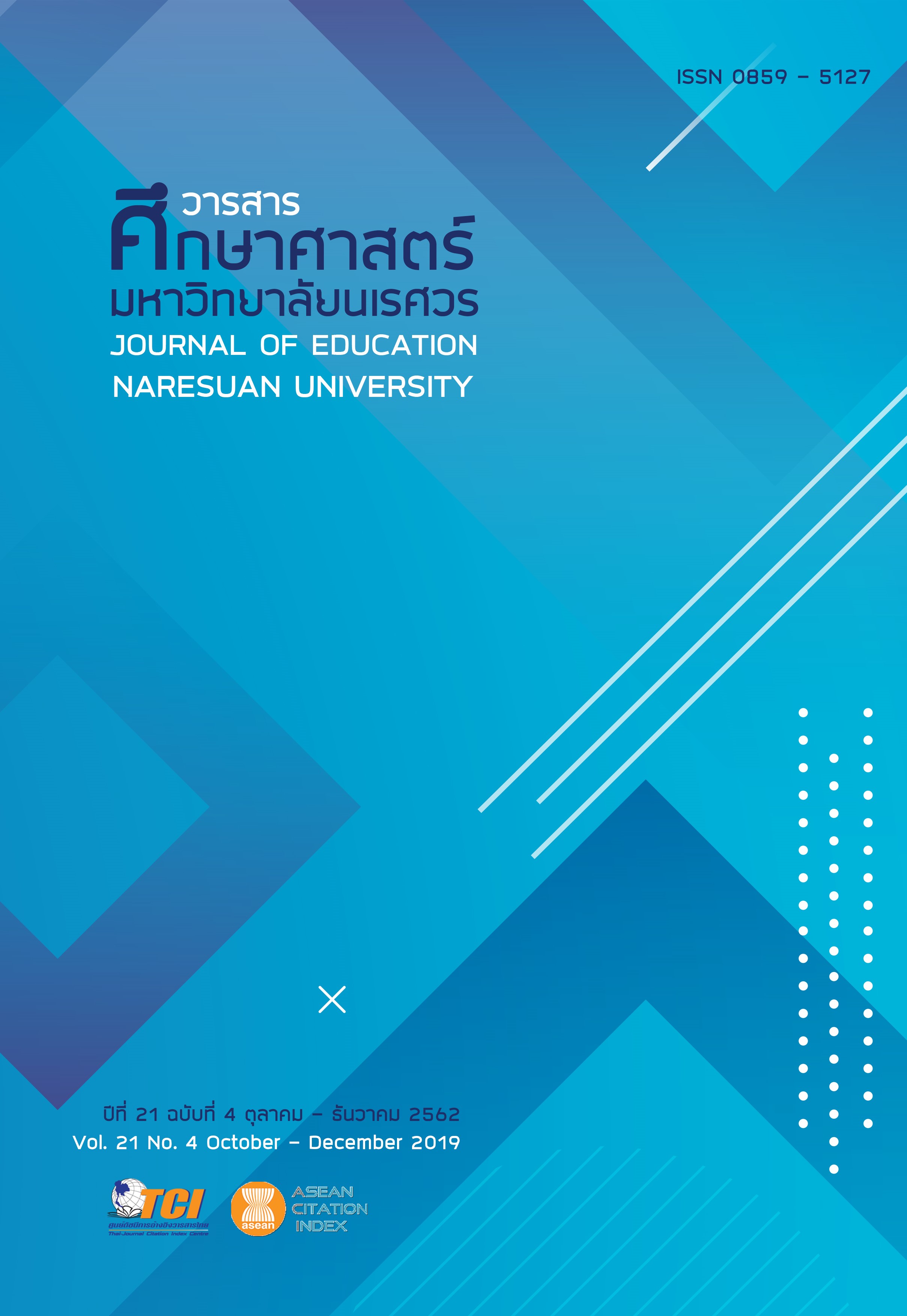การพัฒนากิจกรรมการเรียนรู้แบบพยากรณ์ที่ส่งเสริมความสามารถในการคิดอนาคต สำหรับนักเรียนชั้นมัธยมศึกษาปีที่ 6 (THE DEVELOPMENT OF LEARNING ACTIVITY BASED ON FORECASTING METHOD TO ENHANCE FUTURISTIC THINKING ABILITY FOR GRADE 12 STUDENTS)
Main Article Content
Abstract
การวิจัยครั้งนี้มีจุดมุ่งหมายเพื่อ 1) สร้างและตรวจสอบคุณภาพของกิจกรรมการเรียนรู้แบบพยากรณ์ที่ส่งเสริมความสามารถในการคิดอนาคต สำหรับนักเรียนชั้นมัธยมศึกษาปีที่ 6 2) ศึกษาผลการใช้กิจกรรมการเรียนรู้แบบพยากรณ์ที่ส่งเสริมความสามารถในการคิดอนาคต สำหรับนักเรียนชั้นมัธยมศึกษาปีที่ 6 ดังนี้ 2.1) ศึกษาความสามารถในการคิดอนาคตของนักเรียนก่อนเรียนและหลังเรียนด้วยกิจกรรมการเรียนรู้แบบพยากรณ์ 2.2) เปรียบเทียบความสามารถในการคิดอนาคตของนักเรียนหลังเรียนด้วยกิจกรรมการเรียนรู้แบบพยากรณ์กับเกณฑ์ร้อยละ 70 กลุ่มตัวอย่างคือ นักเรียนชั้นมัธยมศึกษาปีที่ 6 โรงเรียนจ่านกร้อง ภาคเรียนที่ 2 ปีการศึกษา 2559 จำนวน 45 คน เครื่องมือที่ใช้ประกอบด้วย แผนการจัดการเรียนรู้แบบพยากรณ์ 4 แผน และแบบวัดความสามารถในการคิดอนาคต โดยใช้เวลาในการจัดการเรียนรู้ 12 ชั่วโมง วิเคราะห์ข้อมูลโดยใช้สถิติค่าเฉลี่ย () ส่วนเบี่ยงเบนมาตรฐาน (S.D.) และสถิติ t – test (one-sample test) ผลการวิจัย พบว่า
1. กิจกรรมการจัดการเรียนรู้โดยแบบพยากรณ์ที่ส่งเสริมความสามารถในการคิดอนาคตมีความเหมาะสมอยู่ในระดับมาก ( = 4.29, S.D. = 0.66) และมีประสิทธิภาพเท่ากับ 81.39 /80.39
2. ความสามารถการคิดอนาคตของนักเรียนชั้นมัธยมศึกษาปีที่ 6 ก่อนเรียนอยู่ในระดับปานกลาง ( = 1.86, S.D. = 0.44) และหลังเรียนอยู่ในระดับมาก (
= 3.21, S.D. = 0.41)
3. ความสามารถในการคิดอนาคตของนักเรียนชั้นมัธยมศึกษาปีที่ 6 หลังเรียนเท่ากับ ( = 49.33, S.D. = 2.86) สูงกว่าเกณฑ์ร้อยละ 70 (
= 42) อย่างมีนัยสำคัญทางสถิติที่ระดับ .01
THE DEVELOPMENT OF LEARNING ACTIVITY BASED ON FORECASTING METHOD TO ENHANCE FUTURISTIC THINKING ABILITY FOR GRADE 12 STUDENTS
The purposes of this research were: 1) to construct and study the efficiency of the learning activities based on forecasting method to enhance futuristic thinking ability for grade 12 students at 80/80,and 2) to implement the learning activities based on forecasting method to enhance futuristic thinking ability for grade 12 students; 2.1) to study the student’s futuristic thinking ability before and after using the learning activities, and 2.2) to compare the student’s futuristic thinking ability after using the learning activities withthecriterion at 70%. The sample group was 45 students of grade 12 at Janokrong School in the second semester of academic year 2016. The research design was One Group Pretest – Posttest Design. The statistics used to analyze the data were mean (), standard deviation (S.D.) and t – test one sample test.The results of the study revealed that:
1. The efficiency of the learning based on forecasting method to enhance futuristic thinking ability for grade 12 students was 81.39/80.39.
2. The students had futuristic thinking ability before using the learning activities on forecasting method indicated a middle level and after indicated a high level.
3. The students had futuristic thinking ability using learning activities on forecasting method learning to enhance futuristic thinking ability after learning was higher than the stated criterion at .01.
Article Details
The owner of the article does not copy or violate any of its copyright. If any copyright infringement occurs or prosecution, in any case, the Editorial Board is not involved in all the rights to the owner of the article to be performed.
References
2.Charoenwongsak, K. (2003). Futuristic thinking. Bangkok: Success Media. [in Thai]
3. Intawong, T. (2009). Process of developing futuristic thinking of gifted students in science and technology (Master thesis). Chiangmai: Chiangmai University. [in Thai]
4. Kupratakul, C. (1997). A history of the future. Bangkok: Kobfire. [in Thai]
5. National Statistical Office. (2015). The juvenile analysis. Bangkok: Bangkok Blog Limited Partnership. [in Thai]
6. Pilanthananon, N. (1983). Futuristic. Bangkok: Success. [in Thai]
7. Pongphoka, S. (2015). The development of problem solving thinking ability of mutthayomsuksa 6 students by future problem solving technique and mind mapping (Master thesis). Bangkok: Sillapakorn University. [in Thai]
8. Saengsawang, W. (2014). The effect of e-learning lessons about seminar in computer education topic for computer education students. Journal of Education Naresuan University, 19(1), 131-145. [in Thai]
9. Suksabai, S. (2012). Learning plans development of global education course on Hae Mai Kam Phoe tradition to promote futuristic thinking skills Mathayom Suksa 2 students at Chomtong School, Chiang Mai province (Master thesis). Chiangmai: Chiangmai University. [in Thai]
10. The Secretariat of the House of Representatives. (2015). The way of solving suicides issue. Journal of the secretariat of the House of Representatives, September, 2-4. [in Thai]
11. Wehmeyer, L. B. (1986). Futuristic. New York: A Growth Company.


